The Simple Power of Play: How the Flying Seagull Project is Bringing Smiles and Laughter to Children Worldwide
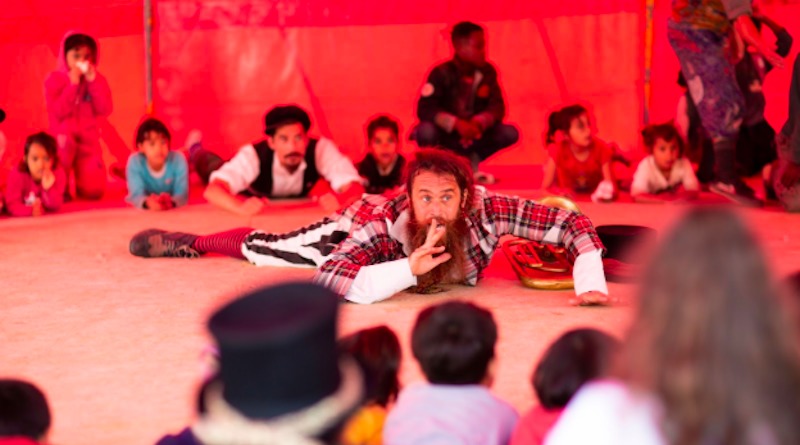
Based in the UK, but with an outreach across 23 countries, The Flying Seagull Project is confronting the harsh reality of refugee camps through the simplicity of play. In 2007, while volunteering at an orphanage in Cambodia, founder, Ash Perrin, identified a lacuna in the care of the children living there. While the essentials: shelter, clothing etc. were being met, one critical element was overlooked, says Ash, “It was someone’s job to feed them, but it was no one’s job to care what they wanted to be when they were older or if they felt confident.” Ash saw this gap as an opportunity to create something new and special, where each child would be seen for their true potential. He went home to recruit fellow entertainers, and four months later the first Seagull Project was in the works in Romania. Since 2008, The Flying Seagull Project has brought laughter to more than 220,000 children with over 4,000 play sessions.
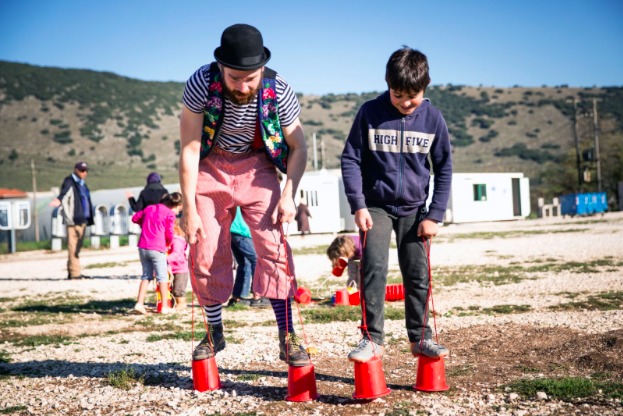
The focus of this social circus project is to transform the most challenging and desperate environments into safe spaces that foster happiness, laughter and the freedom for children to express themselves; spaces in which play time is not a luxury but an integral part of daily activity. Composed of clowns, musicians, entertainers and actors, The Flying Seagull Project team visits refugee camps worldwide with their big top tent, enriching communities with interactive clowning and magic workshops, participatory circus shows and play sessions. As a centerpiece of their mission, The Flying Seagull Project highlights the “power of play” and its critical role in child development, sense of security, and the healthy ecosystem of a community. Ash points out that in crisis stricken communities, despite its agency in a prosperous environment, play is often the first thing to be neglected. After 14 years of Seagulls, Ash attests to the socially-medicinal character of play on both the community and the individual level.
“In Romania, we were working with some adults who had learning difficulties…they were quite young adults, mid to late teens. And we were doing a music session…we play with rhythm, we play games around voice and song, so it’s not a music learning session it’s a play session that allows music to be its conversation starter…We were going round the circle introducing ourselves…and at the end we were talking to the staff of the centre and they were amazed that one of the boys had said his name. And they explained to us that he had been visiting the centre for something like seven or eight years and hadn’t spoken to them…So, in the safety, in the sanctity and in the held space of a game, the young lad felt confident and encouraged enough to join in.”
Experiences in which play empowers, though distinctive, are not seldom but a “sea of many.” In a more recent project, Ash witnessed an equally eloquent example while working with child refugees at a camp in Greece.
“There was a young man who had been through an awful journey, he and his family…and it resulted in him becoming very withdrawn, very aggressive towards his mother…So we joined the camp and we set up a big top, and after two or three weeks…he’d gone from showing up and being very aggressive to us and to other children, or just simply not taking part, to being our number one attendee. Speaking to his mother afterwards, a person who’s with us was told he’s just completely changed: he goes to bed early so he’s got energy for the play session, he’s now got friends…he’s chatting away to his mother telling her everything that’s been going on… literally all that was after two weeks of play in our big top.”
The Flight of the Seagulls
Though the UK is home base, The Flying Seagull Project has created safe spaces for children at refugee camps, asylum shelters and transition centers across four continents. (A map of their outreach locations can be foundhere!) The project originally took root in Romania but was quick to spread to Europe during the refugee crisis.
“When the refugee situation appeared all over our televisions and all over the media it was really evident, as it always is, that at least 40% of the people affected were children.”
The Flying Seagull Project made ties with a charity called Humanitas, that provides hydrocephalus treatment and training in west Africa. Alongside the Humanitas medical staff, The Flying Seagulls provided clowning to patients.
“An amazing amount of research and evidence shows that having a clown or a play person or that sort of a playful character present, both during the examination and then pre- and post-op, can increase a child’s recovery speed” (Dionigi et al). One connection seemed to lead to the next, and Ash found that the work The Flying Seagull Project provided was in high demand.
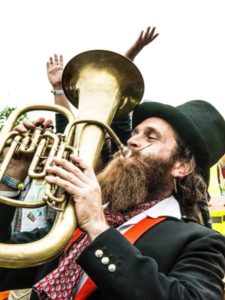 When integrating themselves into a new and vulnerable community, The Flying Seagull Project takes care to approach a new project in a respectful and gentle fashion. This often looks like a show, several shorter sessions with the children, evening cinemas and discos at which parents are welcomed and encouraged to join, and outreach to significant members of the community; doctors, priests, mayors, etc.
When integrating themselves into a new and vulnerable community, The Flying Seagull Project takes care to approach a new project in a respectful and gentle fashion. This often looks like a show, several shorter sessions with the children, evening cinemas and discos at which parents are welcomed and encouraged to join, and outreach to significant members of the community; doctors, priests, mayors, etc.
Securing a location can prove tricky at times. The Flying Seagulls must first make a case for support and work around visa bureaucracy. The COVID-19 Pandemic has further complicated such navigations.
“The COVID-19 pandemic has had a devastating impact on our projects, specifically the ones that were based in the camps in Samos, across Athens, in Lesbos…It was impossible to share games and sessions with the kids without putting them and their parents and their elderly relatives, who all share extremely substandard accommodation, in danger. So all of our international projects were immediately frozen…As well as that, we had to get our performers home. We had around 30 performers on the ground at the time, as well as a team of six of us who were in Norway.”
As every cloud has a silver lining, Ash and his team have learned to look at the lessons that came from a year of quarantine in spite of its difficulties. There is always room for adaptation and in the Seagull’s case, a need for it. The pandemic has forced many artists to be creative and The Flying Seagull Project is no exception. The pandemic required Ash and his team to make innovative alterations to their pre-quarantine routine including the introduction of digital packages for their supporters.
“In many schools we hosted an online theatre production which used participatory techniques from our live sessions to engage more than 6,000 people across the UK. We then launched our Laugh ’n’ Play UK projects, which are show-and-games tours across the UK, and we built a snowmobile, which is a specially adapted large van that now has a side stage and an escape hatch through the front cab. So we can arrive somewhere, climb through the back, lower the station, do a show, climb back through and leave without actually ever getting out of the van, which allows social-distancing.”
Anything to continue the laughter and play!
Lessons for the Clown, Wisdom for the World
The Flying Seagulls outreach is not limited to international work. While confined to work within UK borders this past year, Ash became aware of “the unfortunate and sad truth that so many areas of the UK are in dire straits: from food poverty to alienation, and ostracized communities pushed out by way of their ethnicity or their refugee status. So we’ve realized that there’s also a huge amount of work that we can be doing while we are in the UK.” In recognition of this need, the Seagulls now provide UK activities on a full-time basis.
The Flying Seagull Project is a 100% non-for profit organization. In conjunction with international outreach, The Seagulls host one-of-a-kind festivals, Children’s Parties, and Bespoke events. These events provide vital funds essential for work overseas.
Similar to the play sessions abroad, at the core of these events, the Seagulls hope to give children confidence, and create an environment in which kids feel safe enough to be their full selves.
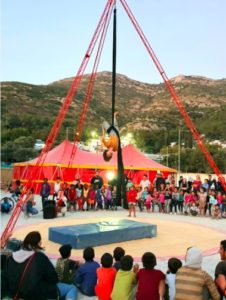
“We speak to them as equals: we speak to them as equal in terms of respect and equal in terms of how funny they are. Kids are funny and they’re sharp and they’re daft, which is the same as us lot,” says Ash.
In reflecting on his time with The Flying Seagull Project and the lessons he has learned these past 14 years, Ash gets at the root of the magic and distinctive quality of circus, “What I’ve learned is everything comes down to energy…If you do the thing you love, with love, for people who you think might love it and you share it with them in a loving way, you are going to create change. And this is how the world can change, this is how people who have been pushed out, marginalized, forgotten or purposely removed, this is how they can feel part of things: it’s passion, it’s love, it’s energy.”
Ash encourages interested readers to get in touch with The Flying Seagulls. “Whatever you’ve got to offer, if you’re willing to offer it with love and energy we’ll always have a space for it on one of our teams, one day, somewhere!” His parting words of advice for readers is to find a laughter partner, someone in their community who would find enjoyment and happiness from the talents you have to share and the things you love to do. “If you’ve got something to offer, there’s someone who needs it. So go and find them, don’t wait for them to come to you. Be the change, be the catalyst, be the circus!”
To support, become a part of or find more information aboutThe Flying Seagull Project, visit www.theflyingseagullproject.com.
Dionigi, Alberto, and Carla Canestrari. “Clowning in Health Care Settings: The Point of View of Adults.” Europe's journal of psychology vol. 12,3 473-88. 19 Aug. 2016, doi:10.5964/ejop.v12i3.1107
Con sede en el Reino Unido, pero con una extensión a través de 23 países, El Proyecto Gaviota Voladora se enfrenta a la dura realidad de los campos de refugiados a través de la simplicidad del juego. En 2007, mientras era voluntario para un orfanato en Camboya, el fundador, Ash Perrin, identificó una falta en el cuidado de los niños que vivían allí. Así que los elementos esenciales; el refugio, la ropa, etc. se cumplieron, un elemento crítico fue pasado por alto, dice Ash, “Era el trabajo de alguien alimentarlos, pero no era el trabajo de nadie preocuparse sobre lo que querían ser cuando eran mayores o si se sentían seguros”. Ash vio esta brecha como una oportunidad para crear algo nuevo y especial, donde cada niño sería visto por su verdadero potencial. Se fue a casa para reclutar a otros artistas, y cuatro meses después el primer proyecto Gaviota Voladora estaba en progreso en Rumania. Desde 2008, El Proyecto Gaviota Voladora ha llevado la risa a más de 220.000 niños con más de 4.000 sesiones de juego.
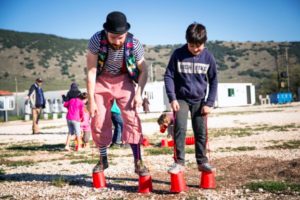 El enfoque de este proyecto social de circo es transformar los entornos más desafiantes y desesperados en espacios seguros que fomenten la felicidad, la risa y la libertad para que los niños puedan expresarse; espacios en los que el tiempo de juego no es un lujo sino una parte integral de la actividad diaria. Compuesto por payasos, músicos, artistas y actores, el equipo del Proyecto Gaviota Voladora visita los campamentos de refugiados de todo el mundo con su gran carpa superior, enriqueciendo a las comunidades con talleres interactivos de payasos y magia, espectáculos circenses participativos y sesiones de juego. Como pieza central de su misión, El Proyecto Gaviota Voladora destaca el “poder del juego” y su papel crítico en el desarrollo infantil, la sensación de seguridad y el ecosistema saludable de una comunidad. Ash muestra que en las comunidades afectadas por la crisis, a pesar de su agencia en un entorno próspero, el juego es a menudo lo primero que se debe descuidar. Después de 14 años de Seagulls, Ash tiene fe en el carácter socio-medicinal del juego tanto a nivel comunitario como individual.
El enfoque de este proyecto social de circo es transformar los entornos más desafiantes y desesperados en espacios seguros que fomenten la felicidad, la risa y la libertad para que los niños puedan expresarse; espacios en los que el tiempo de juego no es un lujo sino una parte integral de la actividad diaria. Compuesto por payasos, músicos, artistas y actores, el equipo del Proyecto Gaviota Voladora visita los campamentos de refugiados de todo el mundo con su gran carpa superior, enriqueciendo a las comunidades con talleres interactivos de payasos y magia, espectáculos circenses participativos y sesiones de juego. Como pieza central de su misión, El Proyecto Gaviota Voladora destaca el “poder del juego” y su papel crítico en el desarrollo infantil, la sensación de seguridad y el ecosistema saludable de una comunidad. Ash muestra que en las comunidades afectadas por la crisis, a pesar de su agencia en un entorno próspero, el juego es a menudo lo primero que se debe descuidar. Después de 14 años de Seagulls, Ash tiene fe en el carácter socio-medicinal del juego tanto a nivel comunitario como individual.
“En Rumanía, estábamos trabajando con algunos adultos que tenían dificultades de aprendizaje…eran adultos jóvenes, adolescentes de medio a tardío. Y estábamos haciendo una sesión de música…jugamos con ritmo, jugamos juegos alrededor de la voz y la canción, por lo que no es una sesión de aprendizaje de música, es una sesión de juego que permite que la música sea su iniciador de conversación…Íbamos dando la vuelta al círculo presentándonos…y al final estuvimos hablando con el personal del centro y se sorprendieron de que uno de los chicos hubiera dicho su nombre. Y nos explicaron que llevaba siete u ocho años visitando el centro y que no había hablado con ellos…Así que, en la seguridad, en la santidad y en el espacio de un juego, el joven se sintió confiado y alentado lo suficiente como para unirse.”
Las experiencias en las que el juego empodera, aunque distintivo, no son pocas sino un “mar de muchos.” En un proyecto más reciente, Ash fue testigo de un ejemplo igualmente elocuente mientras trabajaba con niños refugiados en un campamento en Grecia.
“Había un joven que había pasado por un viaje horrible, él y su familia…y resultó en que se volviera muy retraído, muy agresivo con su madre…Así que nos unimos al campamento y establecimos una carpa superior grande, y después de dos o tres semanas…había pasado de aparecer y ser muy agresivo con nosotros y con otros niños, o simplemente no participar, a ser nuestro asistente número uno. Hablando con su madre después, una persona que está con nosotros fue informada que el joven acaba de cambiar por completo: se va a la cama temprano, así que tenga energía para la sesión de juego, ahora tiene amigos…está charlando con su madre contándole todo lo que ha estado pasando…literalmente todo eso fue después de dos semanas de juego en nuestra carpa superior grande.”
El vuelo de las gaviotas
Aunque el Reino Unido es la base de operaciones, El Proyecto Gaviota Voladora ha creado espacios seguros para los niños en los campamentos de refugiados, refugios de asilo y centros de transición en cuatro continentes. (¡Un mapa de sus ubicaciones de alcance se puede encontraraquí!) El proyecto se arraigó originalmente en Rumanía, pero se extendió rápidamente a Europa durante la crisis de los refugiados.
“Cuando la situación de los refugiados apareció en todas nuestras televisiones y en todos los medios de comunicación, era realmente evidente, como siempre lo es, que al menos el 40% de las personas afectadas eran niños.”
El Proyecto Gaviota Voladora hizo lazos con una organización benéfica llamada Humanitas, que proporciona tratamiento y entrenamiento de hidrocefalia en África occidental. Junto con el personal médico de Humanitas, El Proyecto Gaviota Voladora proporcionó payasadas a los pacientes.
“Una increíble cantidad de investigación y evidencia muestra que tener un payaso o una persona de juego o ese tipo de personaje juguetón presente, tanto durante el examen como después, puede aumentar la velocidad de recuperación del niño” (Dionigi et al). Una conexión parecía conducir a la siguiente, y Ash encontró que el trabajo que El Proyecto Gaviota Voladora proporcionaba era de alta demanda.
 Al integrarse en una comunidad nueva y vulnerable, El Proyecto Gaviota Voladora se tiene cuidado de abordar un nuevo proyecto de una manera respetuosa y suave. Esto a menudo parece un espectáculo, varias sesiones más cortas con los niños, cines nocturnos y discotecas en las que los padres son bienvenidos y alentados a unirse, y alcance a miembros significativos de la comunidad; médicos, sacerdotes, alcaldes, etc.
Al integrarse en una comunidad nueva y vulnerable, El Proyecto Gaviota Voladora se tiene cuidado de abordar un nuevo proyecto de una manera respetuosa y suave. Esto a menudo parece un espectáculo, varias sesiones más cortas con los niños, cines nocturnos y discotecas en las que los padres son bienvenidos y alentados a unirse, y alcance a miembros significativos de la comunidad; médicos, sacerdotes, alcaldes, etc.
Asegurar una ubicación puede ser complicado. Las gaviotas voladoras primero deben hacer un caso para el apoyo y trabajar alrededor de la burocracia de visas. La Pandemia del COVID-19 ha complicado aún más este tipo de navegaciones.
“La pandemia de COVID-19 ha tenido un impacto devastador en nuestros proyectos, específicamente en los que estaban basados en los campamentos de Samos, en Atenas, en Lesbos…Era imposible compartir juegos y sesiones con los niños sin ponerlos, y a sus padres y a sus parientes mayores, todos los cuales comparten un alojamiento extremadamente deficiente, en peligro. Así que todos nuestros proyectos internacionales se detuvieron inmediatamente. Además de eso, tuvimos que llevar a nuestros artistas a casa. Teníamos alrededor de 30 artistas en el terreno en ese momento, además de un equipo de seis de nosotros que estábamos en Noruega.”
Como cada nube tiene un revestimiento plateado, Ash y su equipo han aprendido a mirar las lecciones que vinieron de un año de cuarentena a pesar de sus dificultades. Siempre hay espacio para la adaptación y en el caso de las Gaviotas, una necesidad de ella. La pandemia ha obligado a muchos artistas a ser creativos y El Proyecto Gaviota Voladora no es una excepción. La pandemia obligó a Ash y su equipo a hacer alteraciones innovadoras en su rutina previa a la cuarentena, incluida la introducción de paquetes digitales para sus partidarios.
“En muchas escuelas organizamos una producción de teatro en la que utilizamos técnicas participativas de nuestras sesiones en vivo para involucrar a más de 6.000 personas en el Reino Unido. Luego iniciamos nuestros proyectos Laugh ‘n’ Play UK, que son giras de espectáculos y juegos por todo el Reino Unido, y construimos una motonieve, que es una furgoneta grande especialmente adaptada que ahora tiene un escenario lateral y una escotilla de escape a través de la cabina delantera. Así que podemos llegar a algún lugar, subir por la parte de atrás, bajar la estación, hacer un espectáculo, volver a subir y salir sin bajar nunca de la camioneta, lo que permite el distanciamiento social. Entonces podemos llegar a algún lugar, subir por la parte de atrás, bajar la estación, hacer un espectáculo, volver a subir y salir sin ni siquiera salir de la camioneta, lo que permite el distanciamiento social.”
¡Cualquier cosa para continuar la risa y el juego!
Lecciones para el payaso, sabiduría para el mundo
El alcance de los Gaviotas Voladoras no se limita al trabajo internacional. Mientras estaba confinado a trabajar dentro de las fronteras del Reino Unido el año pasado, Ash se dio cuenta de “la desafortunada y triste verdad de que tantas áreas del Reino Unido están en una situación desesperada: desde la pobreza alimentaria hasta la alienación, y las comunidades condenadas al ostracismo expulsadas por su origen étnico o su estatus de refugiado. Así que nos hemos dado cuenta de que también hay una gran cantidad de trabajo que podemos hacer mientras estamos en el Reino Unido.”
El Proyecto Gaviota Voladora es una organización 100% sin fines de lucro. Junto con el alcance internacional, Las Gaviotas organizan festivales únicos y fiestas infantiles. Estos eventos proporcionan fondos vitales esenciales para trabajar en el extranjero.
Al igual que las sesiones de juego en el extranjero, en el centro de estos eventos, las Gaviotas esperan dar confianza a los niños y crear un ambiente en el que los niños se sientan lo suficientemente seguros como para ser plenamente ellos mismos.
 “Les hablamos como iguales: les hablamos como iguales en términos de respeto e iguales en términos de qué cómicos son. Los niños son graciosos y son agudos, que es lo mismo que nosotros,” dice Ash.
“Les hablamos como iguales: les hablamos como iguales en términos de respeto e iguales en términos de qué cómicos son. Los niños son graciosos y son agudos, que es lo mismo que nosotros,” dice Ash.
Al reflexionar sobre su tiempo con El Proyecto Gaviota Voladora y las lecciones que ha aprendido estos últimos 14 años, Ash llega a la raíz de la magia y la calidad distintiva del circo: “Lo que he aprendido es que todo se reduce a la energía…Si haces lo que amas, con amor, por personas que crees que podrían amarlo y lo compartes con ellos de una manera amorosa, vas a crear un cambio.Y así es como el mundo puede cambiar, así es como las personas que han sido expulsadas, marginadas, olvidadas o eliminadas a propósito, así es cómo pueden sentirse parte de las cosas: es pasión, es amor, es energía.”
Ash anima a los lectores interesados a ponerse en contacto con Las Gaviotas Voladoras. “Lo que tienes que ofrecer, si estás dispuesto a ofrecerlo con amor y energía, ¡siempre tendremos un espacio para ello en uno de nuestros equipos, algún día, en algún lugar!” Su consejo final para los lectores es encontrar un compañero de risa, alguien en su comunidad que encontraría el disfrute y la felicidad de los talentos que tienes que compartir y las cosas que te encanta hacer. “Si tienes algo que ofrecer, hay alguien que lo necesita. Así que vete a buscarlos, no esperes a que vengan a ti. ¡Sea el cambio, sea el catalizador, sea el circo!”
Para apoyar, formar parte o encontrar más información sobre El Proyecto Gaviotas Voladoras, visitewww.theflyingseagullproject.com
Dionigi, Alberto, and Carla Canestrari. “Clowning in Health Care Settings: The Point of View of Adults.” Europe's journal of psychology vol. 12,3 473-88. 19 Aug. 2016, doi:10.5964/ejop.v12i3.1107
Editor's Note: At StageLync, an international platform for the performing arts, we celebrate the diversity of our writers' backgrounds. We recognize and support their choice to use either American or British English in their articles, respecting their individual preferences and origins. This policy allows us to embrace a wide range of linguistic expressions, enriching our content and reflecting the global nature of our community.
🎧 Join us on the StageLync Podcast for inspiring stories from the world of performing arts! Tune in to hear from the creative minds who bring magic to life, both onstage and behind the scenes. 🎙️ 👉 Listen now!
